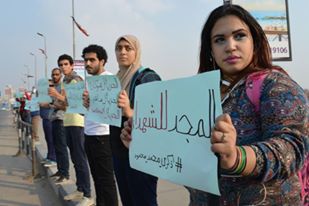Nine Mohamed Mahmoud anniversary detainees to face trial

CAIRO, Dec. 8 (Aswat Masriya) - Nine people arrested last month while commemorating the fourth anniversary of deadly protests in an iconic Downtown Cairo street were referred to court on Tuesday.
The group, mostly belonging to the now banned April 6 Youth Movement, face charges of "illegal assembly" and "protesting without a permit".
Egypt's latest protest law has been widely criticised by domestic and international human rights organisations which say it violates global standards that allow peaceful protests. But many, mostly youth, have been detained and convicted for violating it since its introduction in November 2013.
On Nov. 19, which coincided with the fourth anniversary of Mohamed Mahmoud, participants built a human chain on Six of October bridge, a main artery in Greater Cairo, carrying hand-written signs remembering the victims. One of them read "glory to the martyrs" and another "write on the walls of the cell, imprisoning revolutionaries is a disgrace and a betrayal."
Fatal clashes on Mohamed Mahmoud Street four years ago in the tumultuous aftermath of the January 2011 uprising, became known as the Mohamed Mahmoud events, a heart-rending memory for many young Egyptians whose dreams for real change were swiftly being dashed.
The clashes on Mohamed Mahmoud Street erupted on November 19, 2011, and continued for five days. Security forces clashed with protesters opposing the transitional rule of the Supreme Council of the Armed Forces (SCAF) in violence that left 50 people dead.
At the time they were the deadliest clashes since the January 2011 uprising. Their significance was accentuated by the proximity of the violence to Egypt's interior ministry headquarters just blocks away.
The protests also marked the growing rift that was starting to show between different groups of protesters, with many criticising the Muslim Brotherhood for abandoning the "revolutionaries" as they were preoccupied with campaigning for parliamentary elections that were held over several months from 2011-2012.
The Brotherhood snapped up 47 percent of seats in Egypt's then-bicameral People's Assembly, which was later dissolved. Since the military ouster of Brotherhood-affiliated President Mohamed Mursi, the group's members has faced a brutal crackdown that killed hundreds and randomly detained thousands of youths.
Today, the walls of Mohamed Mahmoud Street are an open gallery showcasing graffiti of the faces of those killed in the protests, pointing the finger of blame on all those who took power in the past five years.









facebook comments